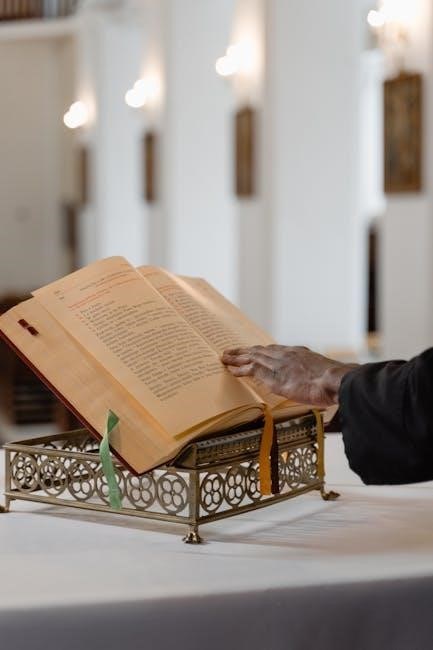God’s holiness is a divine attribute central to His nature, emphasizing His transcendence and moral perfection․ It is the foundation of His character, inspiring awe and transformation in human lives, as explored in R․C․ Sproul’s works and biblical accounts․
1․1․ Defining Holiness in the Context of God’s Nature
Holiness is the essence of God’s nature, representing His absolute moral purity, transcendence, and separation from sin․ It is the divine attribute that defines His perfection and uniqueness, setting Him apart from creation․ This quality is central to understanding His character, as it embodies His righteousness and majesty, inspiring awe and reverence in those who encounter it․
1․2․ The Significance of Holiness in Christian Theology
Holiness is a cornerstone of Christian theology, reflecting God’s perfection and moral purity․ It underscores His transcendence and the moral standard for humanity․ This attribute is central to understanding salvation, as it highlights humanity’s need for redemption and God’s grace, forming the foundation of a God-centered life and worship, as emphasized in R․C․ Sproul’s teachings and biblical narratives․

The Holiness of God in Scripture
Scripture portrays God’s holiness as central to His nature, revealed in passages like Isaiah 6:1-4 and Revelation 4:8, emphasizing His transcendence, perfection, and humanity’s sinfulness before Him․
2․1․ Biblical Portrayals of God’s Holiness
The Bible vividly portrays God’s holiness through imagery and encounters, such as Isaiah’s vision in Isaiah 6:1-4, where God’s majestic presence evokes awe and repentance․ Similarly, Revelation 4:8 describes God as “holy, holy, holy,” surrounded by worshiping creatures, emphasizing His transcendence and perfection․ These depictions highlight God’s separateness from sin and humanity’s humble response to His divine nature․
2․2․ Key Passages Highlighting God’s Holiness (e․g․, Isaiah 6:1-4)
Isaiah 6:1-4 vividly portrays God’s holiness, describing the Lord as “high and exalted” with seraphim crying “holy, holy, holy․” This passage underscores divine transcendence and purity․ Other key passages, such as Leviticus 11:44-45 and Revelation 4:8, emphasize God’s call to holiness and His eternal, worship-worthy nature, inspiring awe and a recognition of human sinfulness in light of His perfect holiness․
R․C․ Sproul’s “The Holiness of God” Book Overview
R․C․ Sproul’s “The Holiness of God” explores the profound essence of God’s holiness, revealing its transformative power and humanity’s sinfulness, while emphasizing its centrality in Christian theology and living․
3․1․ Summary of the Book’s Main Themes
R․C․ Sproul’s “The Holiness of God” delves into the essence of God’s holiness, highlighting its transcendence, moral perfection, and humanity’s sinfulness․ The book emphasizes how encountering God’s holiness transforms individuals, fostering humility, repentance, and a deeper understanding of grace․ Sproul also explores the biblical portrayal of holiness, particularly through Isaiah’s vision, illustrating its profound impact on Christian living and theology․
3․2․ The Structure and Key Chapters of the Book
R․C․ Sproul’s “The Holiness of God” is structured over nine chapters, each exploring a unique facet of God’s holiness․ Key chapters include examinations of Isaiah’s vision in Isaiah 6:1-4, the transcendence of God, and the relationship between holiness and grace․ The book systematically unpacks biblical themes, offering a comprehensive and accessible understanding of this divine attribute and its implications for Christian living and theology․
The Nature of God’s Holiness
God’s holiness is His transcendence and moral perfection, a unique attribute separating Him from creation․ It reflects His divine nature, emphasizing purity, sovereignty, and incomparable greatness, as central to His being․
4․1․ God’s Transcendence and Perfection
God’s transcendence refers to His existence beyond human understanding and creation, emphasizing His sovereignty and independence․ His perfection signifies completeness and flawlessness in all attributes, making Him distinct from humanity․ Holiness encompasses both, highlighting God’s unparalleled greatness and moral purity, as R․C․ Sproul elaborates, underscoring the divine nature that inspires awe and reverence in His presence․
4․2․ The Relationship Between Holiness and God’s Other Attributes
God’s holiness is intricately linked with His other attributes, such as love, justice, and mercy․ Holiness serves as the foundation, ensuring these attributes align with His divine character․ Sproul highlights how holiness harmonizes God’s righteousness and grace, revealing a consistent and perfect nature that inspires both reverence and trust in believers, as explored in-depth in “The Holiness of God․” This interplay underscores His divine coherence and moral integrity․

The Impact of God’s Holiness on Human Life
Encountering God’s holiness transforms individuals, revealing their sinfulness and need for grace․ It fosters humility, awe, and devotion, inspiring lives marked by reverence and pursuit of righteousness․
5․1․ How Encountering God’s Holiness Transforms Individuals
Encountering God’s holiness profoundly transforms individuals by revealing their sinfulness and need for grace․ This experience fosters humility, deep repentance, and a renewed sense of purpose, inspiring a life of worship and obedience to Him․ Through this transformation, individuals gain a clearer understanding of God’s majesty and their place before Him, leading to spiritual growth and a deeper devotion to His will․
5․2․ The Role of Holiness in Christian Living
Holiness is central to Christian living, guiding believers to live according to God’s moral standards․ It involves separation from sin and dedication to God, reflecting His character in daily life․ Holiness empowers believers to live as God’s people, set apart for His purposes, and to pursue a life transformed by His grace, enabling them to glorify Him in all they do, striving to be like Christ․
The Fear of God and Reverence
The fear of God is a profound reverence rooted in His holiness, inspiring awe and transforming lives through encounters with His divine majesty and moral perfection․
6․1․ Understanding the Fear of God in the Bible
The fear of God, as depicted in Scripture, is not mere dread but a reverential awe that arises from recognizing His holiness and authority․ Biblical narratives, such as Isaiah’s encounter in Isaiah 6, illustrate how this fear leads to humility, repentance, and a deeper devotion to God’s will, fostering a God-centered life․
6․2․ How Holiness Inspires Awe and Reverence
God’s holiness evokes profound awe and reverence, as it reveals His transcendent majesty and moral perfection․ Encountering such divine purity humbles individuals, fostering a deep sense of reverence and wonder․ This awe often leads to heartfelt worship, as seen in Isaiah’s response in Isaiah 6, where the reality of God’s holiness transforms and overwhelms, inspiring devotion and a pursuit of righteous living․

Sin and Its Relation to God’s Holiness
Sin starkly contrasts God’s holiness, revealing human imperfection and moral failure․ It creates a chasm between God and humanity, necessitating grace and redemption for reconciliation․
7․1․ The Contrast Between God’s Holiness and Human Sin
God’s holiness, as depicted in the Bible, is starkly contrasted with human sin, which is a direct violation of His divine standards․ This contrast highlights humanity’s moral imperfection and the need for redemption through grace, as sin separates individuals from God’s pure and sacred nature, necessitating a divine solution for reconciliation and restoration․
7․2․ The Consequences of Sin in Light of God’s Holiness
Sin, in the face of God’s holiness, results in spiritual separation and judgment․ It incurs divine wrath and condemnation, as sin rebels against God’s perfect nature․ This separation necessitates redemption through Christ, who bridges the gap created by humanity’s transgressions, offering forgiveness and restoration to those who repent and seek His grace․

Grace and Redemption in the Context of Holiness
Grace addresses the separation caused by sin, offering redemption through Christ․ His sacrifice restores humanity’s holiness, enabling believers to reflect God’s divine character and live in His presence․
8․1․ How Grace Addresses the Separation Caused by Sin
Grace bridges the chasm created by sin, offering divine forgiveness through Christ’s sacrifice․ It restores humanity’s relationship with God, enabling believers to experience His holiness and live transformed lives․ This redemption underscores God’s mercy and love, providing a path to reconciliation and spiritual renewal․
8․2․ The Role of Christ in Restoring Holiness to Humanity
Christ’s sacrifice and resurrection are central to restoring humanity’s holiness․ Through His atonement, sin is forgiven, and believers are sanctified, reflecting God’s holy character․ Christ’s work enables individuals to live in accordance with God’s will, embodying holiness in their thoughts, actions, and devotion to Him․

Practical Implications of God’s Holiness
God’s holiness calls believers to live humbly, ethically, and reverently, inspiring worship and a deep pursuit of moral purity, transforming lives through awe and devotion to Him․
9․1․ Living a Life That Reflects God’s Holiness
Encountering God’s holiness profoundly transforms individuals, revealing the depth of human sinfulness and inspiring a pursuit of purity․ This transformation compels believers to live righteously, demonstrating compassion and humility․ As emphasized by R․C․ Sproul, grace empowers this journey, enabling Christians to reflect God’s moral integrity and reverence in their daily lives, thereby honoring His divine character․
9․2․ Worship and the Pursuit of Holiness
True worship reflects reverence for God’s holiness, inspiring believers to pursue a life of purity and obedience․ Through prayer, hymns, and sacraments, worship aligns our hearts with God’s divine nature, fostering humility and awe․ R․C․ Sproul emphasizes that encountering God’s holiness in worship transforms individuals, prompting them to live as His image-bearers, reflecting His moral integrity in daily life․
The Holiness of God in Contemporary Theology
Contemporary theology continues to emphasize God’s holiness as central to His character, drawing from R․C․ Sproul’s insights to explore its relevance in modern Christian thought and practice․
10․1․ Modern Perspectives on God’s Holiness
Modern theology often views God’s holiness through the lens of transcendence and moral purity, emphasizing its transformative impact on human lives․ R․C․ Sproul’s work highlights this, showing how contemporary scholars integrate traditional biblical teachings with fresh insights, making God’s holiness relatable and essential for today’s Christian living and spiritual growth․
10․2․ The Relevance of Sproul’s Teachings Today
R․C․ Sproul’s teachings on God’s holiness remain profoundly relevant, offering timeless insights into divine transcendence and human sinfulness․ His work bridges traditional theology with contemporary issues, making complex doctrines accessible․ Sproul’s emphasis on holiness as foundational to Christian living continues to inspire and transform modern believers, ensuring his legacy endures in shaping today’s theological discourse and personal faith journeys․

Resources for Further Study
Explore R․C․ Sproul’s The Holiness of God book, online courses, and sermons for deeper insights․ Additional materials include theological articles, study guides, and recommended readings on God’s holiness․
11․1․ Recommended Books and Articles on God’s Holiness
Explore The Holiness of God by R․C․ Sproul, a foundational book on the topic․ Additional resources include The Cross of Christ by John Stott and articles from theological journals like Theological Encyclopedia․ These works provide deep insights into God’s holiness, its biblical significance, and practical applications for Christian living, offering a comprehensive understanding of this divine attribute․
11․2․ Online Courses and Sermons by R․C․ Sproul
R․C․ Sproul’s teachings on God’s holiness are available through online courses and sermons on platforms like Ligonier Ministries․ These resources explore biblical truths, emphasizing the transformative power of encountering God’s holiness․ Sproul’s curriculum guides complement his audio/video presentations, offering deeper insights into God-centered living and the significance of holiness in Christian theology․
God’s holiness is the cornerstone of His divine nature, inspiring awe and transformation․ R․C․ Sproul’s teachings emphasize its profound impact on Christian living and spiritual growth․
12․1․ Recap of the Importance of God’s Holiness
God’s holiness is central to His nature, emphasizing His transcendence and moral perfection․ It serves as the foundation for understanding His divine character, inspiring awe, transformation, and reverence․ Encountering God’s holiness reveals human sinfulness, prompting repentance and a deeper reliance on grace․ This attribute underscores the necessity of living a sanctified life, reflecting His purity and righteousness in daily conduct․
12․2․ Final Thoughts on Applying the Concept in Daily Life
Embracing God’s holiness transforms daily life by fostering reverence, moral integrity, and a deep desire to reflect His character․ Through prayer, worship, and ethical living, believers can honor God’s transcendence while striving for personal sanctification․ This pursuit not only enriches one’s spiritual journey but also serves as a testament to the transformative power of encountering divine holiness in everyday circumstances․
References and Bibliography
Key sources include R․C․ Sproul’s The Holiness of God, published in 1985 by Tyndale House Publishers, and various online resources like Ligonier Ministries and Google Books, offering PDF versions for deeper study․
13․1․ Key Sources Used in the Article
The primary source is R․C․ Sproul’s book, The Holiness of God, published by Tyndale House Publishers in 1985․ Additional resources include PDF versions from Ligonier Ministries and Google Books․ The book is also available on Internet Archive, offering a free download․ These sources provide a comprehensive understanding of God’s holiness, making them essential for in-depth study and analysis of the topic․
13;2․ Additional Reading Materials
For further exploration, The Holiness of God by R․C․ Sproul is available as a free PDF on Internet Archive and Google Books․ Additional materials include Ligonier Ministries’ study guides, which complement the book․ These resources offer deeper insights into God’s holiness, aiding readers in their theological studies and personal spiritual growth․